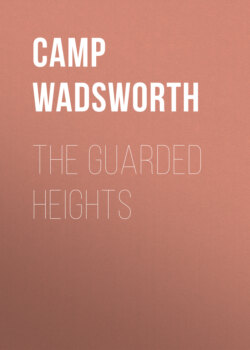Читать книгу The Guarded Heights - Camp Wadsworth - Страница 23
На сайте Литреса книга снята с продажи.
VIII
ОглавлениеTable of Contents
In the examination hall George called upon his will to drive from his mind the details of that encounter. Lambert might be dependable, but if Sylvia had actually recognized him what might she not say to Betty Alston? He didn't want to see the kindness vanish from Betty's eyes, nor the friendliness from her manner. Lambert's assurance, moreover, that Sylvia had forgotten him lingered irritatingly.
"I will not think of it," George told himself. "I will think of nothing but this paper. I will pass it."
This ability to discipline his mind had increased steadily during his hours before Sylvia's portrait. The simple command "I will," was a necessity his brain met with a decreasing reluctance. For two hours now it excluded everything except his work. At the end of that time he signed his paper, sat back, and examined the anxious young men crowded about him in the long room. From these he must sooner or later detach the ones of value to himself. That first quick appraisal disclosed little; they were clothed too much to a pattern, wearing black jerseys, more often than not, black clothes, with black caps hanging from the supports of their chairs. In their faces, however, were visible differences that made him uneasy. Even from a uniform, then, men, to an extent, projected discrepancies of birth, or training, or habit. He sighed and turned in his paper.
At the foot of the stairs groups collected, discussing the ordeal pessimistically. As he started to walk through, several spoke to George.
"How did you hit it, Morton?"
Already he was well spotted. He paused and joined the apprehensive chatter.
"It's a toss-up with me," Rogers admitted. "Don't tell me any answers. If ignorance is bliss, I want to stay dumb."
He caught George's arm.
"Have you met Dicky Goodhue? Hello, Goodhue!"
Goodhue gave the impression of not having met Rogers to any extent. He was a sturdy young man with handsome, finely formed features. George looked at him closely, because this young man alone of the Freshmen he had met remained unmoved by his fame.
"Would like you to meet Morton, Goodhue."
Goodhue glanced at George inquiringly, almost resentfully.
"George Morton," Rogers stumbled on, as if an apology were necessary. "Stringham, you know, and Green——"
"Glad to meet you," Goodhue said, indifferently.
"Thanks," George acknowledged as indifferently, and turned away.
Goodhue, it came upon him with a new appreciation of difficulties, was the proper sort. He watched him walk off with a well-dressed, weak-looking youth, threading a careless course among his classmates.
"How long have you known this fellow Goodhue?" George asked as he crossed the campus with Rogers.
"Oh, Goodhue?" Rogers said, uncomfortably. "I've seen him any number of times. Ran into him last night."
"Good-looking man," George commented. "Where's he come from?"
"You don't know who Dicky Goodhue is!" Rogers cried. "I mean, you must have heard of his father anyway, the old Richard. Real Estate for generations. Money grows for them without their turning a hand. Dicky's up at the best clubs in New York. Plays junior polo on Long Island."
George had heard enough.
"If I do as well with the other exams," he said, "I'm going to get in."
With Freshmen customs what they were, he was thinking, he could appear as well dressed as the Goodhue crowd. He would take pains with that.
He passed Goodhue on his way to the examination hall that afternoon, and Goodhue didn't remember him. The incident made George thoughtful. Was football going to prove the all-powerful lever he had fancied? At any rate, Rogers' value was at last established.
He reported that evening to Bailly:
"I think it's all right so far."
The tutor grinned.
"To-day's beyond recall, but to-morrow's the future, and it cradles, among other dragons, French."
He pointed out passages in a number of books.
"Wrestle with those until midnight," he counselled, "and then go to sleep. Day after to-morrow we'll hope you can apply your boot to a football again."
Mrs. Bailly stopped him in the hall.
"How did it go?" she asked, eagerly.
Her anxiety had about it something maternal. It gave him for the first time a feeling of being at home in Princeton.
"I got through to-day," he said.
"Good! Good!"
She nodded toward the study.
"Then you have made him very happy."
"I always want to," George said. "That's a worthy ambition, isn't it?"
She looked at him gropingly, as if she almost caught his allusion.
